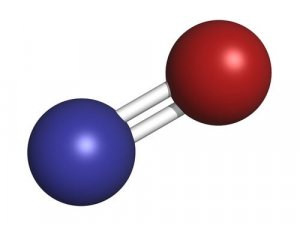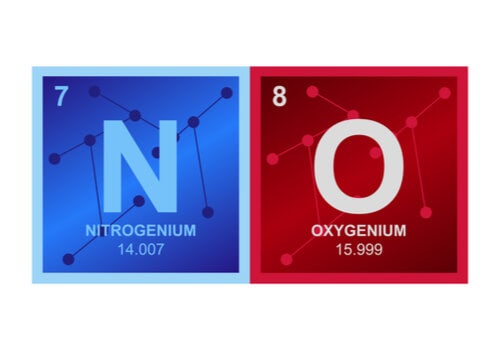Nitric Oxide: The Amazing Gaseous Neurotransmitter

Nitric oxide is a neurotransmitter with amazing functions. For example, it aids our memory, conditions the quality of our sleep, and can even boost our sexual relationships. In this article, we’ll explore in detail how it works.
Millions of substances circulate continuously through our bodies. Some of them are neurotransmitters, which, among other things, regulate our behavior. In particular, today we’ll be talking about the role of nitric oxide, which is a somewhat unknown compound.
In their book, Neuroscience: Exploring the Brain, Mark F. Bear, Barry W Connors, and Michael A. Paradiso explain that nitric oxide (NO) is produced from the amino acid arginine and functions as an intercellular messenger. In effect, nitric oxide is a type of exotic chemical messenger.
It’s a small substance in our nervous system that’s permeable to the cell membrane. It becomes diffused more freely than other transmitter molecules. In fact, “it penetrates through cells and affects other cells behind it” (Bear, Connors & Paradiso, 2016, p. 162).
In addition to this, it’s a liposoluble molecule, and in our nervous system it acts as a neurotransmitter. It’s also related to several of our body functions. Because of this, its discovery has led to different types of research. For example, Duarye, Espinoza, Díaz, Sánchez, Lee Eng, Mijangos, and Barragán have studied its clinical implications and published a scientific article in the Journal of Internal Medicine of Mexico.

What’s the importance of nitric oxide?
We can see how important this gaseous molecule is when we understand the functions it performs in our nervous system. Let’s have a look at some of them:
- It improves the performance of our immune system.
- It favors the dynamics of our memory processes.
- Nitric oxide helps us use senses such as smell.
- It helps to reduce inflammation and blood clotting.
- It gives our muscles greater endurance and helps to develop and strengthen them.
- Finally, it plays an important role in gastric functions.
Some authors think that nitric oxide doesn’t meet all the necessary criteria for us to be able to call it a neurotransmitter. And there are others who claim that this gaseous molecule performs neuromodulator functions.
Fun facts about nitric oxide
Nitric oxide not only participates in the functions described above, but has other surprising functions too.
Nitric oxide is essential in erectile tissues and also helps us to achieve restful sleep.
Its influence in sexual intercourse
Regarding erectile tissues, nitric oxide works in combination with acetylcholine, another neurotransmitter. Vasoactive intestinal peptide is released by parasympathetic nerve terminals, and this causes the relaxation of smooth muscle cells in the arteries of the clitoris and penis.
As a result, arteries that are normally flaccid become filled with blood, causing the organs to distend. In other words, our sexual organs swell thanks to nitric oxide. Because of that, it’s essential for sexual intercourse because of the influence it has on the clitoris and the penis.
Even the medications used to address erectile dysfunction take advantage of the functions of nitric oxide, and this favors the flow of blood to the penis. These days, viagra is the the most well-known of all these medications, and it helps nitric oxide to be released into the nerve endings.
Its influence in our sleep
The second benefit, as we mentioned above, is that nitric oxide influences the quality and duration of our sleep. But how does it do it? Well, in effect, what it does is delay messages from reaching certain neurons, thus helping to delay brain activation which would lead to it sending the signal to wake us up.

The function of this neurotransmitter in promoting sleep quality can be a bit complex to understand, since the levels of this gaseous molecule are at their highest during wakefulness. They also rise rapidly when there’s sleep deprivation.
To get a bit more technical, what this gaseous molecule does is trigger the release of adenosine, a substance that promotes non-REM sleep, and this is what suppresses the activity of the neurons that favor wakefulness.
In summary, nitric oxide is as essential as other neurotransmitters. It carries out several functions in our nervous system and helps it to function in a healthy way. Isn’t that amazing?
Thanks to nitric oxide, our blood coagulates correctly, we can sleep well, become stronger, defend ourselves, recognize several types of aromas, and even reach orgasm more easily.
All cited sources were thoroughly reviewed by our team to ensure their quality, reliability, currency, and validity. The bibliography of this article was considered reliable and of academic or scientific accuracy.
Bear, M. F. Connors, B. W., PAradiso, M.A. Nuin, X.U., Guillén, X.V & Sol Jaquotor, M.J. (2008). Neurociencias la exploración del cerebro. Wolters Kluwer/Lippicott Williams & Wikins.
Duarte Mote, J., Espinoza López, R.F., Díaz Meza, S., Sánchez Rojas, G., Lee Eng, V. E., Mijangos Cháves, J.M., Barragán Garfias, J.A. (2008). Óxido nítrico: metabolismo e implicaciones clínicas. Revista de Medicina Interna de México, 24 (6), pp. 397-406.
Kandel, E. R., Schwartz, J. H., & Jessel, T.M. (2001). Principios de neurociencia. Madrid: McGrawHill Interamericana.
This text is provided for informational purposes only and does not replace consultation with a professional. If in doubt, consult your specialist.








